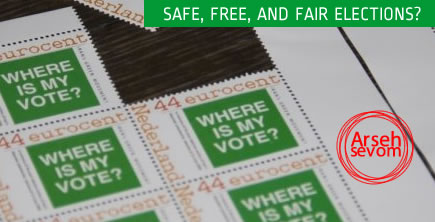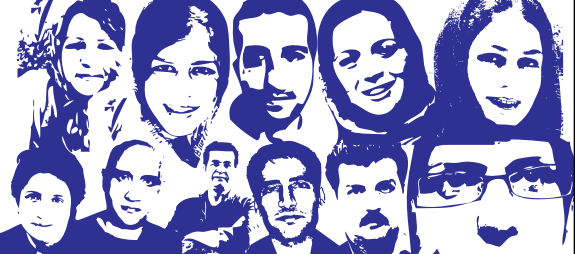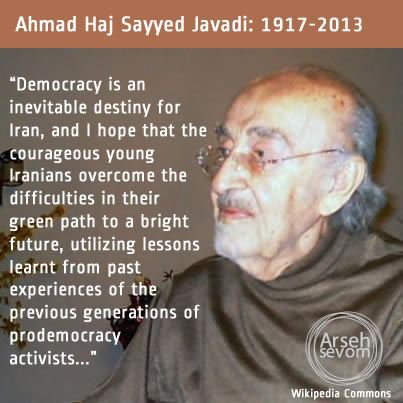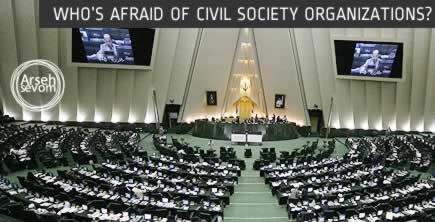
Iran: Bill Before Parliament Would Smother NGOs
January 29, 2013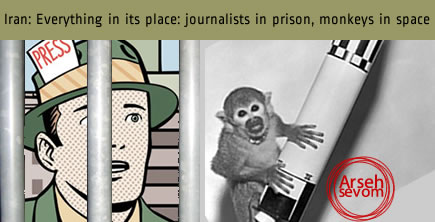
Iran: A Monkey in Space, Journalists in Prison
January 31, 2013Declaring free elections without saying “free elections”
The Supreme Leader of Iran, Ali Khamenei, shot himself in the foot last week when he called for an end to public demands for free elections, reported Radiofarda [en]. In response to comments made in recent weeks by figures such as former presidents Akbar Hashemi Rafsanjani and Mohammad Khatami, who said the presidential election should be free, fair, and competitive, Ali Khamenei said:
“They shouldn’t constantly say elections must be free. It’s obvious that elections should be free.”
He added on January 8:
“Since the beginning of the revolution until now we’ve had [more than] 30 elections… which one has not been free?”
According to Mr. Khamenei, anyone speaking of ‘free elections’ is assisting Iran’s enemies. The head of the Political Bureau of the Revolutionary Guards, Commander Yadollah Javani, reiterated Khamenei’s call five months before the scheduled election through a lead article in in the Guards’ weekly newspaper, Sobh-e Sadegh [fa]. The article is entitled: “Is the Slogan ‘Free Election’ Code for Another Sedition?”
In a bit of twisted rhetoric, the issue has become how can Iran’s leadership declare free elections without, of course, saying “free elections” while still ensuring that their candidate wins?
The Supreme Leader’s threat against talk of “free elections” has not been obeyed. In fact, it has triggered even more discussions among Iranian netizens. Social network users have been sharing a Google graph which illustrates an increase in the number of searches for the term “free elections” in Persian on January 8 and subsequent days.
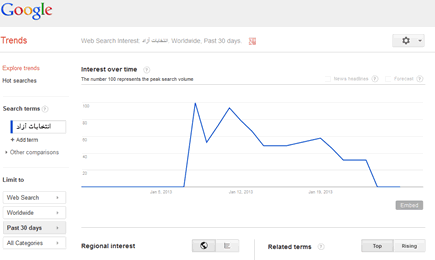
In response to Khamenei’s comment, Shahriar raised this question in a post [fa]
“Which [free] elections exactly are you talking about?”
Fanoos e Basirat [fa], a blogger loyal to the Supreme Leader, who introduces himself as a young officer in the soft war and economic Jihad believes that the “free election plan” proposed by Khatami means the sedition is emerging again.
“The free election plan was first introduced on 15 June 2009 to nullify the election and re-stage it under the supervision of international observers… the losing reformist figures have once again brought it up. Khatami’s proposal on ‘free elections’ is a re-emergence of sedition. The term ‘free election’ seems to indicate that the 10th presidential election was not free, hence holding a free election will bring back peace to the country. This means that the country is not at peace, which is a baseless statement.”
Maryam [fa] has also analyzed the current political situation of Iran in her blog and encouraged Iranians to participate in the upcoming election with open eyes. She then implicitly criticized Khatami, writing:
“The enemy is trying to discourage people from participating in elections and in the meantime, advocates for his desired candidate as the righteous candidate. A candidate who after an 8-year gap, can hand over the helm of the most popular revolution to the leaders of western lands.”
Naser [fa] provides an introduction to free and fair elections and says although elections have existed in Iran for a long time, “free and fair” are two international concepts which are lacking in Iran’s electoral system. He then focuses on civil disobedience as a tool to demand such fundamental rights.
“The process of civil disobedience began during the 2009 election with the political practices of Iranian society and faced cruel suppression by the Iranian government. The famous slogan, ‘where is my vote,’ is in fact a protest about the lack of ‘free and fair elections’ and the public demands to secure them. “
Roya-e Azadi [fa] posted a picture of Mir Hossein Moosavi
“Free elections is your right and mine. We have not forgotten that we have not yet gotten our 2009 vote back… We will only participate in a free and fair election.”
Other netizens such as Ammar Maleki have proposed other alternatives. In his post [fa], “Demanding ‘safe elections’, a strategic joint proposition” Ammar states:
Those who want to guarantee free elections and are playing the election game, should answer this question: what happened to those who paid a very high price for asking ‘where is my vote?’
If we talk about free elections or the introduction of a progressive candidate or talk about Mousavi or Karroubi as a candidate or anything else, we should include what we need for free elections. We should make all this a circle that includes all the other demands.
He then continues by saying that the demand for safe elections not only is not in contradiction with any other strategy such as “free elections,” but also a precondition for any other strategy.
By:
Peyman Majidzadeh


